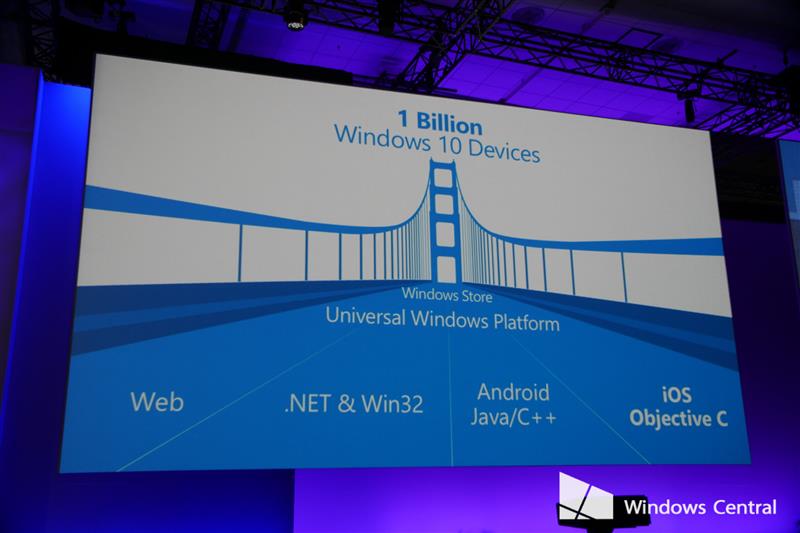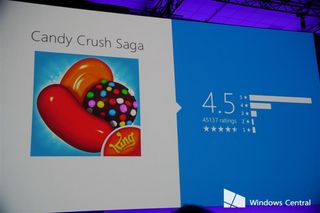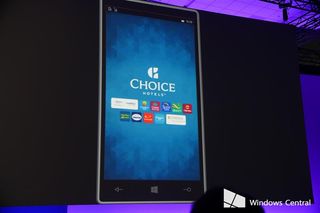Microsoft going all out courting iOS and Android developers for Windows 10
Microsoft has long been rumored to be including Android app support in Windows, but what it announced at Build 2015 looks much better than anyone may have ever imagined it to be.

Because it doesn't just stretch to Android, either. Microsoft is courting iOS app developers, too, in fact, it already has done. Windows 10 isn't the first platform to go looking at another platforms apps. But it does look at least right now, as if it's being handled a little differently.
BlackBerry 10 is one of the more high-profile platforms to integrate an Android app solution. It allows regular Android apps to run on BlackBerry devices, installed as an APK and run using an Android runtime to push them through and make it all work. BlackBerry even went as far as to enter into a deal to have the Amazon Appstore running officially on its devices.

I dabbled with this in its early days and the experience was mixed. On the one hand, it allowed apps that just weren't available in BlackBerry World to be installed and run on BB10 devices. But in the early days it relied upon an old version of Android built in, and the user experience was pretty jarring. BlackBerry native apps behaved one way, Android apps another. The experience has improved vastly over time, but it's still Android apps running in an Android runtime inside of BlackBerry 10.
Android apps on Windows 10 won't be handled in such a way. Microsoft is making it so that Android developers can reuse their existing Java and C++ code to create a Windows 10 Universal App. The result will be a Windows app that behaves like a Windows app. It can use live tiles, Cortana and Xbox Live, for example. It'll require a little work on developers part, Google services will be substituted for Microsoft services, and all apps will integrate with the standard Windows navigation.
So, underneath, it'll be an Android app. Except it won't really be an Android app when you download it on Windows 10. The code is the same, but the end result is more tailored to the Windows 10 experience. Microsoft is giving those developers a straight forward channel to get their apps on Windows 10, with added Microsoft goodness.

And it's a similar story with Objective C, better known as iOS applications. In fact, we learned during the same presentation that this has already begun with the smash hit Candy Crush Saga. Released completely secretively as a recompiled version of the iPhone release, Candy Crush has received high ratings in the Windows Phone Store indicating that the experience is certainly pretty good.
Games are naturally a little different to apps. User interface isn't so much an issue for one. But, as demonstrated by Microsoft, this isn't just good for phones. An iOS game (presumably from the iPad) was shown being played in a window on the Windows 10 desktop. The beauty of the new universal platform at work.
Get the Windows Central Newsletter
All the latest news, reviews, and guides for Windows and Xbox diehards.
So, what this isn't is just some lazy virtual work Microsoft has done to get these apps running in any old way on Windows 10. User experience remains a key priority, as illustrated by developers having full access to Microsoft APIs. The big play is that it's going to be such an efficient process that it would be enticing to developers to open up additional revenue and userbase using what they've already spent time and money developing.

Whether it works or not actually getting the apps over, that's a different issue. Snapchat is a prime case here. Microsoft is making it so easy to bring either its Android or iOS app to Windows 10 that you'd think they'd finally relent and do it. Right? That's still the elephant in the room. Some developers may just be happy to ignore Windows for whatever their own reasons. But, Windows 10 is an exciting proposition, and we can but hope.
So, this isn't the freak out many of us thought it could be when the rumors first surfaced. Microsoft is clearly doing everything it can to get those developers onto Windows, but not at the expense of its user experience. Now, we have to play the waiting game. How this all turns out could well play a huge part in the future of Windows 10.

Richard Devine is a Managing Editor at Windows Central with over a decade of experience. A former Project Manager and long-term tech addict, he joined Mobile Nations in 2011 and has been found on Android Central and iMore as well as Windows Central. Currently, you'll find him steering the site's coverage of all manner of PC hardware and reviews. Find him on Mastodon at mstdn.social/@richdevine